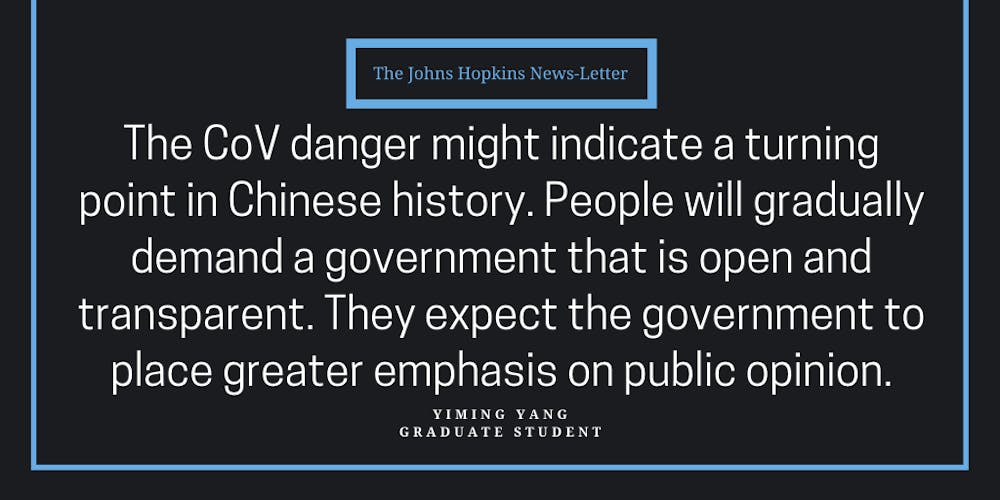Coronavirus (CoV) is currently spreading all over the mainland of China. It has already constituted the deaths of over 1,100. Since the first CoV case in Wuhan, China on Dec. 1, it has not only brought about 45,000 individuals infected with virus, but has also activated Chinese civic awareness.
Chinese people are starting to wake up and raise their voice for their benefit. I am writing this article to record this historical turning point, since I strongly believe the country will change to allow freedom of speech after this CoV disaster.
CoV derived from the Huanan Seafood Market in Wuhan. The Market offers more than just seafood: Merchants also sell wildlife, such as bats and pangolins, as some Chinese people eat them.
It is possible that CoV transmits from these animals to the human body through consumption, saliva and air, according to South China Agricultural University. Some citizens eat these animals because they treat wildlife as a noble symbol and nutritious food, without knowing the potential threats to health.
When the first 41 people with the virus came to hospitals, they did not get enough medical attention. The Wuhan government’s slow response and actions delayed the control of the disease.
At the end of 2019, Li Wenliang, a doctor who first reported the risks of CoV, was even asked by Wuhan police to write a confession. He was forbidden to speak about it, since it could threaten local officials in politics. However, this suppression of public opinion eventually led to China suffering the consequences today.
On Feb. 6, Wenliang died from CoV. He kept working hard in hospitals to save the patients during January, although he was forbidden by police to emphasize the threats of CoV to the public.
At the same time, the number of patients in Wuhan with CoV increased to over 5000. Infected with the virus from his patients and under tremendous mental stress, Wenliang eventually fell.
His death aroused the anger of millions of young Chinese people on social media platforms Weibo and WeChat. Many of them expressed dissatisfaction with the local government and the speech restriction policy. Some proposed establishing a park in memory of Wenliang and the virus disaster. Others asked the Wuhan government to apologize to his family.
Various views collide. But one thing is certain: Most young Chinese people realized the importance of supervising their governments. They are also realizing that they have the power to criticize bad behavior because they are part of the country.
I felt sorry about Wenliang’s death, but I was mostly astonished by the current phenomenon in mainland China. Obviously, people have woken up. They express ideas through Weibo, essentially the Chinese Twitter. They are aware of their civil responsibilities and citizenship. They start to recognize the power of the government must be limited, to avoid another tragedy. They begin to rethink the medical system and administrative mechanism and recommend how to improve them. Chinese people are becoming increasingly brave in order to change the status quo.
For example, on Feb. 1, a group of Chinese internet users exposed the Chinese Red Cross corruption and misuse of relief supplies during the virus disaster. Criticism pushed the Beijing government to send an investigation team to inquire into China’s Red Cross. It is part of the International Committee of the Red Cross, but unlike most other countries’ organizations, it is government-controlled. This creates opportunities for the Chinese Red Cross to accept and use funds without supervision. That’s how the corruption could happen under anger.
The CoV danger might indicate a turning point in Chinese history. People will gradually demand a government that is open and transparent. They expect the government to place greater emphasis on public opinion.
The good news is that the central government of China is also struggling to respond to this demand of its people. The relationship between Chinese people and their government will bring changes to China, especially in politics.
I believe that, after the virus disaster, China will have a second life.
From my perspective, this change means the Chinese political system will become more transparent and democratic. Civilians will wake up to voice for their benefits and attach more importance to their civil rights, especially speaking out and supervising the government. This pushes Chinese politicians to care about people’s demands and promote reform to make a difference.
As a Chinese person, I’d love to see this change. I believe that we are the people, and the power must finally belong to the people.
Yiming Yang is a graduate student at the Carey Business School. He is from China.





